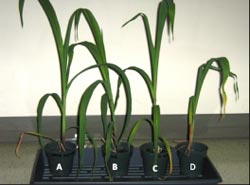Bacteria Can "Fertilize" Copper-Polluted Soil

Maize grown in soil with copper and bacteria (C) appears as vigorous as the control plant (B).
Now, however, Ramakrishna Wusirika’s research team may have discovered how to make plants grow in the mine-waste desert and soak up some copper while they are at it.
Wusirika, a biological sciences professor at Michigan Technological University, began his research using several species of Pseudomonas bacteria from the sediments of Torch Lake. In the region’s copper-mining heyday, the lake was used as a dump for mine waste. “We found bacteria that are resistant to high levels of copper,” he said. “We thought we might be able to use them to help plants grow better on contaminated soils.”
So Wusirika’s research team added copper to soil samples and then inoculated them with a copper-resistant strain of Pseudomonas. Finally, they planted the samples with maize and sunflower seeds and waited.
As expected, seeds planted in copper-free soil thrived, and seeds planted in the copper-tainted soil without bacteria were stunted. But seeds planted in the coppery soil enriched with bacteria did much better; some were nearly as vigorous as plants grown without the toxic metal.
“The bacteria seem to help with plant growth, and they also help maize and sunflower uptake copper,” said Wusirika. That means some kinds of naturally occurring bacteria could make soil more fertile and, in concert with the plants, remove at least some of the copper, a process known as rhizoremediation.
Their work, coauthored by PhD student Kefeng Li and Wusirika, was published online March 1 in the Journal of Hazardous Materials. For their next project, Wusirika’s team has been testing how well their technique might work in a real copper-mining desert. They are in the process of using these bacteria to promote plant growth in stamp sands collected near the small Upper Peninsula village of Gay, where the copper-processing byproduct covers about 500 acres.
Ramakrishna Wusirika, 906-487-3068
Media Contact
More Information:
http://www.mtu.edu/news/All latest news from the category: Agricultural and Forestry Science
Newest articles

Bringing bio-inspired robots to life
Nebraska researcher Eric Markvicka gets NSF CAREER Award to pursue manufacture of novel materials for soft robotics and stretchable electronics. Engineers are increasingly eager to develop robots that mimic the…

Bella moths use poison to attract mates
Scientists are closer to finding out how. Pyrrolizidine alkaloids are as bitter and toxic as they are hard to pronounce. They’re produced by several different types of plants and are…

AI tool creates ‘synthetic’ images of cells
…for enhanced microscopy analysis. Observing individual cells through microscopes can reveal a range of important cell biological phenomena that frequently play a role in human diseases, but the process of…





















